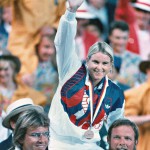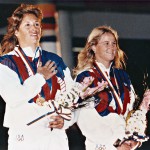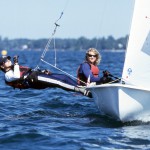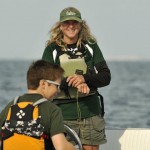Allison Jolly described her entry into sailing as an “accident.”
The USF women’s varsity sailing coach and 1988 Olympic Gold Medalist in sailing grew up in St. Petersburg before most houses had air conditioning. To stay cool during the summers, she said there were four choices: go to the only air-conditioned department store downtown, swim, waterski or sail.
Jolly’s preference was swimming. So, when her parents put her in an introductory sailing program at age 9, she wasn’t happy. And after being caught in a horrible thunderstorm at sea, she was ready to quit.
Forced by her parents to finish what she started, she completed the course, ready to be done with it. However, the man running the sailing program stopped her. He asked her to join a race team.
Jolly agreed and won a medal her first race. Suddenly, she realized she was better at sailing than she was at swimming.
She continued to sail throughout college and lived in Georgia and California, working as a chemist and a computer programmer. In 1984, the Olympics came to California, and for the first time, women were allowed to sail.
Jolly’s participation in the Olympics was also a self-proclaimed “accident.”
“I never dreamed sailing would open to the women,” she said. Her husband at the time was ambitious and told her she would regret it if she decided not to try out for the 1988 Olympics in Korea.
At the Olympic Panel in the Nelson Poynter Memorial Library on Jan. 14, she told the crowd she was “lucky.”
It’s more difficult to make the Olympic team in sailing than it is to actually win the gold medal, she said.
“I don’t have a bad sailing memory,” she said, but went on to describe her favorite memory as “horrible.”
Her final race in the Olympics was the windiest race in the history of the games to date. She and her teammate had to finish in 11th place in order to win the gold medal, but boats were capsizing all around them, so it was impossible to tell what place they were in. After the race, they had to sail two hours to return to shore before knowing what place they finished in.
She remembers crying as the news cameras surrounded her, still not knowing how she finished. Finally, the media told her: They won the gold.
After the Olympics, Jolly returned to California as a computer programmer. When she moved to Florida in 2001, she couldn’t find a job in her field.. She never wanted a career in sailing but got a job as a sailing coach at a Tampa high school, as, unsurprisingly, an accident.
She subbed for the sailing coach for a day, and then found out he quit. There was little she could do but accept the job.
Two years later, Jolly was hired by USF. She is now approaching her 10th year as the women’s sailing coach.
In addition to sailing, Jolly enjoys working out, planting and reading science fiction novels.
“I’ll read just bad sci-fi just because it’s there,” she said.
At the Olympic forum she compared her medal with the medal won by Jennifer French, the silver medalist on the U.S. Sailing Team at the 2012 London Paralympics. French’s was heavier than Jolly’s. The back of the medal was decorated with waves personalized for sailing by a London artist.
Jolly rolled her eyes. “I have a scantily clad Greek goddess on the back of mine,” she said.
news@crowsneststpete.com






